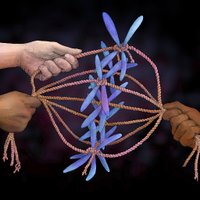
Marzia Munafò
@munafomarzia
Exploring oocyte epigenomes @EMBL @hackettlab | PhD @Cambridge_Uni @CRUK_CI Hannon lab | (small)RNA enthusiast | Scientific illustrator outside the lab
ID: 1117363462978592768
https://www.munafomarzia.com 14-04-2019 09:46:23
1,1K Tweet
5,5K Followers
893 Following

Very excited to be MPI of Immunobiology & Epigenetics for the #epigenetics meeting 🧬 Come say hi during the poster session to hear about oocyte epigenetics!


One of my illustrations made an appearance at the MPI of Immunobiology & Epigenetics #epigenetics conference! thanks to the boss Jamie Hackett presenting the cool science we do in the lab 🔥



Amazing work by Marzia Munafò who illustrated our @PauliGroup's findings on the "lock-and-key" mechanism that initiates #fertilisation👇

Check out this beautiful representation of our work by Marzia Munafò uncovering the molecular bridge between sperm and egg! 🔑🤩 We had lots of fun brainstorming together with Marzia and seeing our discoveries come to life in this artistic rendition 🧵


Sneak peek at some of the participating artists: @hhbarrera Laura Olivares Boldú Patricia Bondia Dr. Jaye Gardiner Anna Hupalowska Rachel Ignotofsky Leonora Martínez Nuñez, PhD @leonoramartinez.bsky. mol mir Marzia Munafò Mary O'Reilly B. Duygu Özpolat, Ph.D. Stefanie Redemann Alex Ritter, PhD Dr. Ahna Skop, Ph.D. Kathleen Sluka Bryan Welm & many more! I am starstruck 🤩






In today's episode of the Night Science Podcast we talk with Martin Schwartz from Yale University about the importance of stupidity in science: while learning science makes you feel smart, true scientific discovery often involves feeling stupid, because it means venturing into the unknown.





